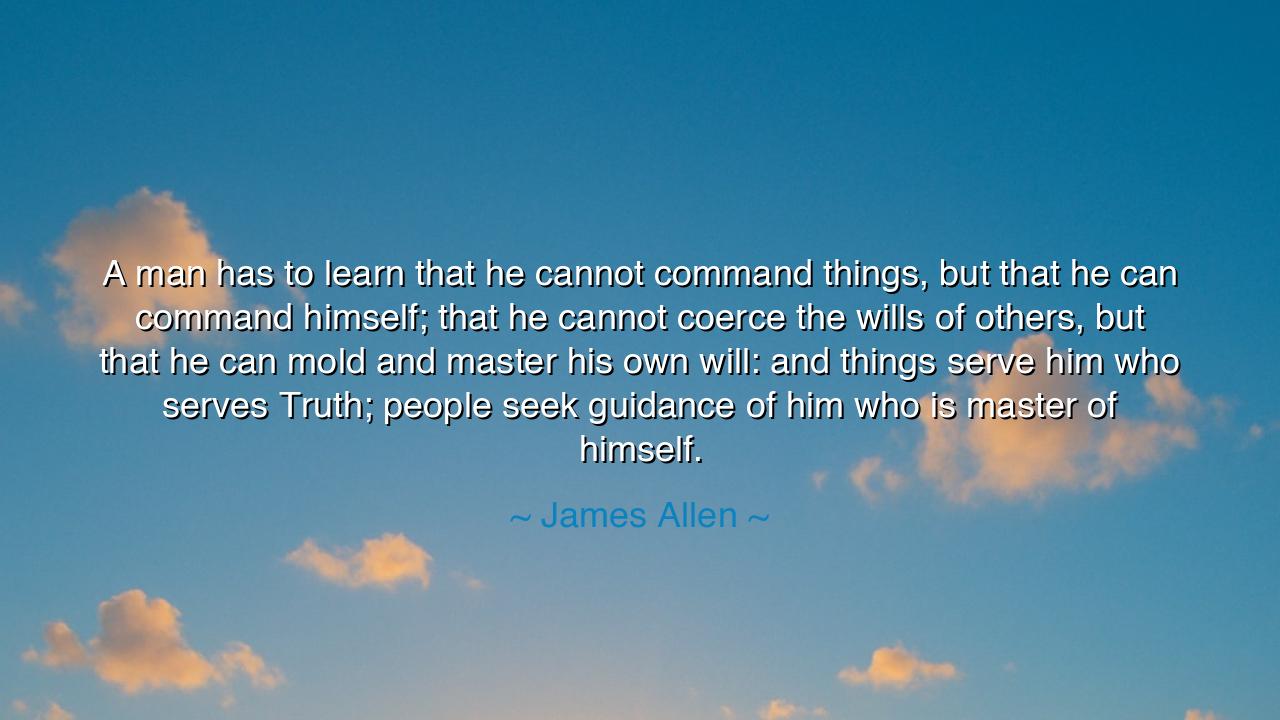
A man has to learn that he cannot command things, but that he can
A man has to learn that he cannot command things, but that he can command himself; that he cannot coerce the wills of others, but that he can mold and master his own will: and things serve him who serves Truth; people seek guidance of him who is master of himself.






"A man has to learn that he cannot command things, but that he can command himself; that he cannot coerce the wills of others, but that he can mold and master his own will: and things serve him who serves Truth; people seek guidance of him who is master of himself." These words of James Allen speak to the profound wisdom that true power lies not in domination over the external world, nor in the control of others, but in the mastery of oneself. In a world where we often seek to bend others to our will and force circumstances to align with our desires, Allen reminds us of the ultimate truth: the greatest strength is found within, in the quiet and steady mastery of our own thoughts, emotions, and actions.
To command things is a pursuit that leads only to frustration, for the world is a shifting, ever-changing realm that resists being controlled. We cannot make the winds blow in the direction we choose, nor can we prevent the sun from setting when its time has come. But what we can control, what we can mold and shape, is our own will. The key to true mastery is not in forcing the world to conform to our desires, but in aligning ourselves with the universal flow of Truth. Truth, in this sense, is the deep wisdom that guides the natural world and the human spirit, a force that transcends personal will and points toward balance, integrity, and purpose.
Consider the life of the great Socrates, who did not seek to command others with his authority or dominate his disciples with force. Instead, he sought to master his own soul, to become a master of reason, and in doing so, he became a beacon of wisdom for those around him. Socrates believed that true strength lay in the ability to examine and refine one's own thoughts, to control one's desires, and to live according to principles of virtue and truth. People did not follow him because of his ability to command, but because of the force of his character, the clarity of his understanding, and the humility of his self-mastery. Those who served Truth, like Socrates, found that the world, in its own way, began to serve them — offering them the respect and reverence of others who sought wisdom.
The story of Mahatma Gandhi serves as another powerful example of self-mastery in action. Gandhi did not seek to coerce the British Empire through military might or force. Instead, he understood that the true path to freedom lay in the mastery of his own will. He chose the path of nonviolence and self-discipline, demonstrating that those who serve Truth — who are aligned with the highest moral principles — are capable of leading others without the need for domination. His ability to master his own will and remain steadfast in his commitment to nonviolent resistance became the force that inspired millions, and through his example, people found the guidance and strength to stand firm in their own struggles.
Self-mastery is not the suppression of desires, but the discipline to align one's actions with higher truths. It is the ability to choose conscious responses rather than be swept away by impulses or external pressures. In our own lives, we may encounter moments when we feel the urge to control situations or people, to force the outcome we desire. But the true path to fulfillment lies in molding ourselves, in cultivating a deep awareness of our own thoughts and actions. When we master our own minds, our desires no longer rule us; we become free to choose how we respond to the world, and through this freedom, we find true power.
This lesson is a call to examine the ways in which we seek to control the external world. How often do we try to bend others to our will, hoping that they will fulfill our desires, or make the world conform to our needs? The true test, as Allen suggests, is not in bending others or manipulating circumstances but in mastering ourselves — in learning how to act with integrity, patience, and wisdom. When we serve Truth, when we live in alignment with our deepest values, we discover that people are drawn to us not by force, but by the magnetic power of our authenticity and clarity.
The final lesson is clear: master yourself. Begin with small acts of self-discipline — choose your thoughts, your actions, your words with intention. Practice the art of self-reflection, and commit to aligning your life with the highest principles of truth, love, and integrity. When you do, the world will begin to serve you, as you serve Truth, and others will seek your guidance not because you command them, but because your self-mastery is a beacon of strength and wisdom. True power is not in the control of others, but in the mastery of oneself, and from this foundation, all things are possible.






AAdministratorAdministrator
Welcome, honored guests. Please leave a comment, we will respond soon